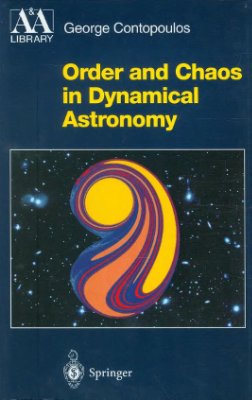Springer, 2010. - 640 pages.
The study of orbits in dynamical systems and the theory of order and chaos has progressed enormously over the last few decades. It thus became an essential tool in dynamical astronomy. The book is the first to provide a general overview of order and chaos in dynamical astronomy. The progress of the theory of chaos has a profound impact on galactic dynamics. It has even invaded celestial mechanics, since chaos was found in the solar system which in the past was considered as a prototype of order. The book provides a unifying approach to these topics from an author who has spent more than 50 years of research in the field. The first part treats order and chaos in general. The other two parts deal with order and chaos in galaxies and with other applications in dynamical astronomy, ranging from celestial mechanics to general relativity and cosmology. This book, addressing especially the astrophysics, is also written as a textbook on dynamical systems for students in physics.
The study of orbits in dynamical systems and the theory of order and chaos has progressed enormously over the last few decades. It thus became an essential tool in dynamical astronomy. The book is the first to provide a general overview of order and chaos in dynamical astronomy. The progress of the theory of chaos has a profound impact on galactic dynamics. It has even invaded celestial mechanics, since chaos was found in the solar system which in the past was considered as a prototype of order. The book provides a unifying approach to these topics from an author who has spent more than 50 years of research in the field. The first part treats order and chaos in general. The other two parts deal with order and chaos in galaxies and with other applications in dynamical astronomy, ranging from celestial mechanics to general relativity and cosmology. This book, addressing especially the astrophysics, is also written as a textbook on dynamical systems for students in physics.

